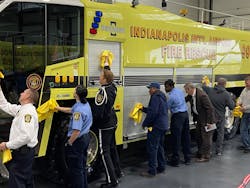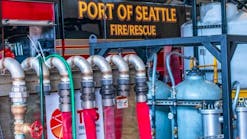Indy Airport Fire Department Inducts New Equipment with Old Traditions
Firefighters, retirees and officials at the Indianapolis International Airport (IND) recently celebrated the arrival of two new aircraft rescue firefighting apparatus, which included ceremonial traditions practiced among firefighters dating back to the 1800s. The event demonstrated the fellowship and team connection candidates looking to serve among Indy airport first responders can expect to find.
“These are age-old traditions that signify teamwork, camaraderie, respect for the job and appreciation for the right resources to do that job,” said Chief Fred Pervine of the Indianapolis Airport Authority fire department.
The event kicked off with a wet down, a tradition of using the old fire truck’s hoses to wet the new truck. The wet down ceremony dates back to the late 1800s when a new fire apparatus was washed with water from an outgoing apparatus. At the event, all attendees were given a memorial towel to help dry the trucks as a symbol of pride.
“The ‘wet down’ is like an anointing to symbolize good luck, safe responses, and passing the proverbial torch,” said Deputy Chief Steve Summers of the IAA fire department.
The ceremony also included a push-in, a tradition that also dates back to the late 1800s when fire departments used horse-drawn equipment.
“After returning to the station after a fire call, the horses could not easily back the equipment into the stations,” said Summers. “So the horses were disconnected from the fire wagons and firefighters pushed the equipment into the bay themselves.”
Indianapolis Fire Department Chaplin Father John McCaslin was also on hand to bless the trucks and all who ride on them. The event topped off with a radio call from the Airport Operations Center, announcing the old trucks officially out of service and the new trucks officially in.
Pervine said the two trucks are specifically designed for aircraft firefighting, each with the capacity to carry 3,000 gallons of water, 420 gallons of foam concentrate, and 500 pounds of dry chemical firefighting agent.
“They have off-road capabilities, floatation tires, independent suspension, and can pump agents through two turrets while driving,” Pervine explained.
Each truck also has a 50-foot boom and a penetrating nozzle to pierce the aluminum skin on an aircraft or cargo box and flood it with a firefighting agent. In addition, each truck has a “low attack” feature that can apply firefighting foam under the aircraft, while simultaneously using an agent from the top.


